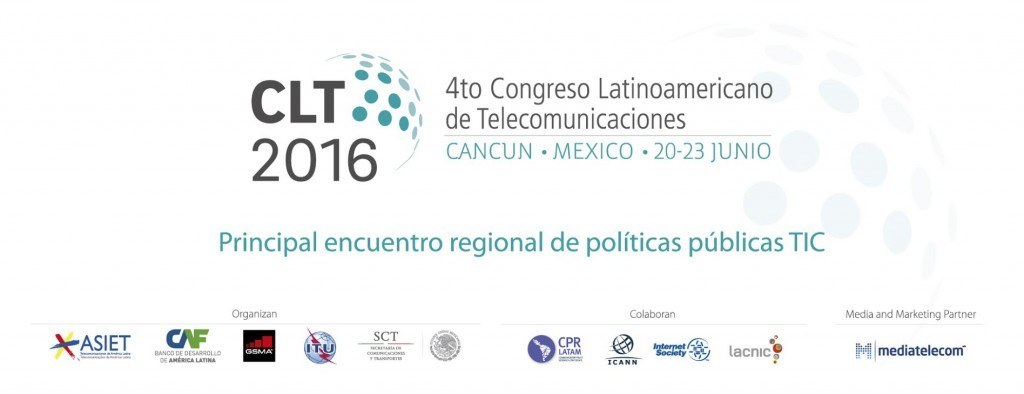21
Jun 2016
A Single Digital Market in Latin America?
I&J contributed
June 21, 2016
Digital Single Market in Latin America
On June 21, 2016, Internet & Jurisdiction’s Bertrand de la Chapelle spoke in a plenary session during the 4th annual Latin American Telecommunications Congress in Cancún, Mexico.
The title of the session was the same as the central question it addressed: “Europe’s Digital Single Market Strategy—Is it Possible to Replicate it in Latin America?” Panelists discussed the outlook of the digital economy in Latin America, the challenges presented by a fragmented market, and the experience of implementing the Digital Single Market in the European Union.
The twenty countries that constitute Latin America and the Caribbean are home to more than 600 million inhabitants. In recent years, the expansion of broadband and the accelerated process of digitalization has contributed billions of dollars to the regional GDP and generated thousands of jobs. As Internet penetration continues across the region, policymakers are considering the potential of a single digital market to promote investment, development, connectivity, and the growth of the digital economy.
Yet despite the benefits of a digital single market for Latin America, implementing common regulatory frameworks to enable the free movement of persons, services, and capital throughout the region will be a large obstacle, especially considering that Latin America currently lacks a supranational governing body like the European Union to ensure implementation and compliance with new regulations.
Mr. La Chapelle spoke about the specific challenges of coexisting national jurisdictions in cyberspace, and how present limitations to legal interoperability might affect Latin America’s transition to a single digital market. Information about the effects of uncoordinated approaches to apply national laws on the Internet on the digital economy, human rights, and the Internet’s technical architecture can be found in the most recent I&J Paper, commissioned by the Global Commission for Internet Governance.
Speakers
Jeffrey Campbell
Vice President of Global Affairs for the AmericasCISCO
Mario Cimoli
Director of Productive and Enterprise DevelopmentEconomic Commission for Latin America and the Caribbean (CEPAL)
Bertrand de La Chapelle
DirectorInternet & Jurisdiction
Ernesto Flores Roux
President CouncilorMexican Federal Institute of Telecommunications
Kaja Kallas
MemberEuropean Parliament
José Juan Haro
Director of Wholesale Business and Regulation for Latin AmericaTelefónica
Juan Manuel Wilches
Expert CommissionerColombian Commission for Communications Regulation
Gonzalo Navarro
Executive Director of the Latin American Internet AssociationLatin American Internet Association (ALAI)
Roberto Viola
General Director, DG CONNECTEuropean Commission
About the Latin American Telcom Congress
The Latin American Telecommunications Congress gathers all of the main actors of the Latin American telecommunications industry to share experiences, best practices, and discuss public policies and regional regulatory challenges. The 2016 CLT was its fourth annual meeting.
The Congress is organized by theInter-American Association of Telecommunications (ASIET), the Development Bank of Latin America (CAF), GSMA, the Mexican Secretariat of Communications and Transport, and the UN International Telecommunication Union.

Digital Single Market in Latin America
On June 21, 2016, Internet & Jurisdiction’s Bertrand de la Chapelle spoke in a plenary session during the 4th annual Latin American Telecommunications Congress in Cancún, Mexico.
The title of the session was the same as the central question it addressed: “Europe’s Digital Single Market Strategy—Is it Possible to Replicate it in Latin America?” Panelists discussed the outlook of the digital economy in Latin America, the challenges presented by a fragmented market, and the experience of implementing the Digital Single Market in the European Union.
The twenty countries that constitute Latin America and the Caribbean are home to more than 600 million inhabitants. In recent years, the expansion of broadband and the accelerated process of digitalization has contributed billions of dollars to the regional GDP and generated thousands of jobs. As Internet penetration continues across the region, policymakers are considering the potential of a single digital market to promote investment, development, connectivity, and the growth of the digital economy.
Yet despite the benefits of a digital single market for Latin America, implementing common regulatory frameworks to enable the free movement of persons, services, and capital throughout the region will be a large obstacle, especially considering that Latin America currently lacks a supranational governing body like the European Union to ensure implementation and compliance with new regulations.
Mr. La Chapelle spoke about the specific challenges of coexisting national jurisdictions in cyberspace, and how present limitations to legal interoperability might affect Latin America’s transition to a single digital market. Information about the effects of uncoordinated approaches to apply national laws on the Internet on the digital economy, human rights, and the Internet’s technical architecture can be found in the most recent I&J Paper, commissioned by the Global Commission for Internet Governance.
Speakers
Jeffrey Campbell
Vice President of Global Affairs for the AmericasCISCO
Mario Cimoli
Director of Productive and Enterprise DevelopmentEconomic Commission for Latin America and the Caribbean (CEPAL)
Bertrand de La Chapelle
DirectorInternet & Jurisdiction
Ernesto Flores Roux
President CouncilorMexican Federal Institute of Telecommunications
Kaja Kallas
MemberEuropean Parliament
José Juan Haro
Director of Wholesale Business and Regulation for Latin AmericaTelefónica
Juan Manuel Wilches
Expert CommissionerColombian Commission for Communications Regulation
Gonzalo Navarro
Executive Director of the Latin American Internet AssociationLatin American Internet Association (ALAI)
Roberto Viola
General Director, DG CONNECTEuropean Commission
About the Latin American Telcom Congress
The Latin American Telecommunications Congress gathers all of the main actors of the Latin American telecommunications industry to share experiences, best practices, and discuss public policies and regional regulatory challenges. The 2016 CLT was its fourth annual meeting.
The Congress is organized by theInter-American Association of Telecommunications (ASIET), the Development Bank of Latin America (CAF), GSMA, the Mexican Secretariat of Communications and Transport, and the UN International Telecommunication Union.



